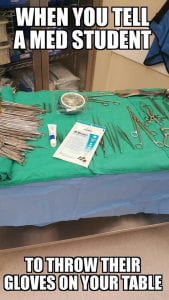| Read time: 3 minutes |
In this post, Ritika Gera, a fifth-year medical student, gives some tips and tricks for making the most of your surgical rotation.
Starting a surgical rotation can feel challenging and scary! It’s normal to feel overwhelmed in an unknown situation, and theatres are like walking into an entirely different universe with new rules to navigate. However, theatres can also be a great learning experience and feel really enjoyable. To help you make the best of your time in surgery, here are some top tips:
Tip 1: Know a little about a lot (not a lot about a little)
No-one expects you to be an expert in any specific operation, so don’t spend hours and hours pre-reading. A general rule of thumb is to know 2-3 sentences of information about any procedure which you can use to show your understanding. It’s also useful to look up indications for and complications of the procedure to illustrate a holistic understanding.
Tip 2: Don’t panic about anatomy!
Try to have a basic understanding of relevant anatomy; much like your pre-clinical anatomy labs, things will make a lot more sense when you have some background knowledge. However, please remember you don’t need to know anatomy at the same expansive level expected in pre-clinical study!
You should revise anatomy which is clinically relevant and links to particular pathology/presentations. For example, you should know the path of the axillary nerve because it’s more likely to be damaged in a fracture of the surgical neck of the humerus. Being able to correlate this information with your knowledge about the function of the posterior cord of the brachial plexus is extremely valuable in clinical practice.
Tip 3: Early is on time, on time is late
Ideally, try to arrive at your theatres slightly earlier than timetabled, so you can accompany the surgical team on their preoperative rounds and clerk a patient. Once a procedure starts it can be difficult to enter theatres so always aim to arrive 5-10 minutes ahead of schedule!
Tip 4: You miss 100% of the shots you don’t take
Ask to scrub in and assist and don’t expect the surgeon to offer. It’s important to clearly state what you need from the session; even if you can’t do much to assist, scrubbing in is a key clinical competence which is important to practice.
Tip 5: Always ask for help when you need it
It’s vital to always ask for help as and when you need it; when it comes to scrubbing in and assisting, no-one expects you to get it right on the first try! Remember the team you’re with once had a ‘first day’ of their own, and if you ask for help, they will understand and do their best to assist you.
Theatres can be a fantastic learning experience for medical students. It’s an opportunity to see things you’ve spent years studying come to life in front of you. You learn valuable skills along the way, such as how operative emergencies are dealt with safely and effectively, and you are exposed to the realities of being a surgeon. Use the opportunity to ask questions, not just about medicine, but about what surgeons’ lives are like; this is vital for figuring out if surgery is something you want to pursue. As with any rotation, to make the most of it, it’s important to be proactive, keen to learn, and enthusiastic to help.
